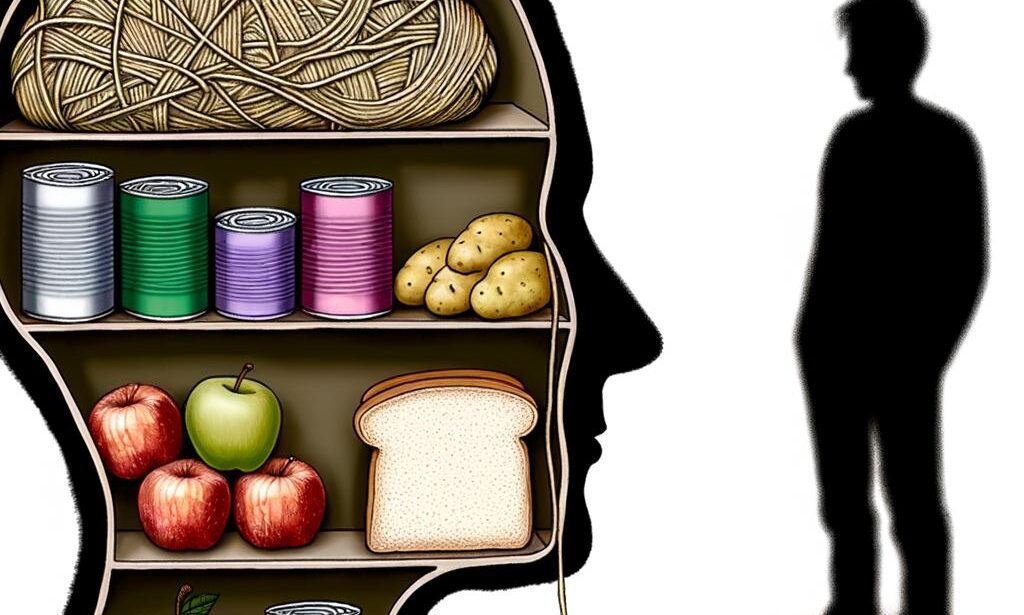Food hoarding, a behavior often characterized by the excessive accumulation and storage of food items, is a complex phenomenon that intertwines psychological, social, and environmental factors. In our article, “Unpacking the Mind: The Psychology of Food Hoarding,” we delve into the intricate psychological underpinnings that drive individuals to hoard food. This behavior can manifest from a variety of motivations, ranging from deep-seated survival instincts to emotional coping mechanisms in response to trauma or scarcity.
As we explore the multifaceted dimensions of food hoarding, we will consider the historical context that has shaped human behaviors around food security, as well as the modern-day triggers that may prompt such actions. The article will examine the impact of food hoarding on individuals and their families, including the psychological distress and practical challenges it can create.
Furthermore, we will discuss the diagnostic criteria and treatment options for those who struggle with food hoarding, drawing upon the latest research and insights from experts in the fields of psychology, psychiatry, and social work. Our objective is to provide a comprehensive understanding of the psychological aspects of food hoarding, offering readers a nuanced perspective on this often-misunderstood behavior. Join us as we unpack the cognitive and emotional layers that contribute to the psychology of food hoarding, shedding light on a subject that affects individuals and communities across the globe.
Table of Contents
- Understanding the Psychology Behind Food Hoarding
- The Impact of Food Hoarding on Mental Health
- Identifying the Root Causes of Food Hoarding Behavior
- Strategies for Overcoming Food Hoarding Tendencies
- Seeking Professional Help for Food Hoarding Issues
- Q&A
- In Retrospect

Understanding the Psychology Behind Food Hoarding
Food hoarding is a complex behavior that can be influenced by a variety of psychological factors. can help us better comprehend why individuals engage in this behavior and how we can support them.
Here are some key psychological factors that contribute to food hoarding:
- Anxiety and Fear: Individuals may hoard food as a response to anxiety and fear of scarcity or not having enough to eat in the future.
- Control and Security: Hoarding food can provide a sense of control and security, especially in times of uncertainty or instability.
- Emotional Attachment: Some individuals may hoard food due to emotional attachment, associating certain foods with comfort or safety.
By understanding these psychological factors, we can approach food hoarding with empathy and develop strategies to address the underlying needs and concerns of individuals who engage in this behavior.

The Impact of Food Hoarding on Mental Health
Food hoarding can have a significant impact on mental health, as it can lead to feelings of anxiety, stress, and even depression. The act of hoarding food can stem from various psychological factors, including fear of scarcity, a need for control, or a history of food insecurity. Understanding the psychology behind food hoarding is crucial in addressing the issue and providing support to those affected.
Some of the ways in which food hoarding can affect mental health include:
- Increased anxiety and stress due to the constant worry about running out of food
- Feelings of isolation and shame, as individuals may feel embarrassed about their hoarding behavior
- Difficulty in seeking help or support, as hoarders may fear judgment or criticism from others
It’s important to recognize that food hoarding is a complex issue that requires a compassionate and understanding approach. By addressing the psychological factors that contribute to hoarding behavior, individuals can receive the support they need to improve their mental well-being and develop healthier relationships with food.

Identifying the Root Causes of Food Hoarding Behavior
Food hoarding behavior can be a complex and multifaceted issue, often rooted in psychological and emotional factors. Understanding the underlying causes of this behavior is crucial in order to effectively address and support individuals who struggle with food hoarding. Here are some key factors to consider when :
- Anxiety and Fear: Many individuals who hoard food may experience high levels of anxiety and fear related to food scarcity or not having enough to eat. This can drive them to stockpile food as a way to alleviate their worries and feel a sense of security.
- History of Food Insecurity: People who have experienced periods of food insecurity in the past, such as during childhood or in times of financial hardship, may develop a hoarding mentality as a coping mechanism to avoid going hungry in the future.
- Emotional Attachment: Some individuals may form emotional attachments to food items, associating them with feelings of comfort, safety, or nostalgia. This emotional connection can lead to an excessive accumulation of food items.
By delving into the underlying psychological and emotional factors that contribute to food hoarding behavior, it becomes possible to provide targeted support and interventions to help individuals overcome this challenging issue.

Strategies for Overcoming Food Hoarding Tendencies
When it comes to overcoming food hoarding tendencies, it’s important to understand the psychology behind this behavior. Many people hoard food due to a fear of scarcity or a need for control. This can lead to excessive stockpiling of food items, which can be detrimental to both physical and mental health. However, there are strategies that can help individuals overcome these tendencies and develop a healthier relationship with food.
Here are some effective :
- Practice mindful eating to become more aware of your food consumption and reduce the urge to hoard.
- Seek professional help from a therapist or counselor to address underlying emotional issues related to food hoarding.
- Set limits on the amount of food you can keep in your home to prevent excessive stockpiling.
- Engage in regular decluttering and organization of your pantry and refrigerator to reduce the temptation to hoard food.
By implementing these strategies and seeking support, individuals can work towards overcoming food hoarding tendencies and fostering a healthier relationship with food.

Seeking Professional Help for Food Hoarding Issues
Food hoarding is a complex issue that can have deep psychological roots. It is not simply a matter of having too much food in the pantry, but rather a manifestation of deeper emotional and mental struggles. is an important step towards understanding and addressing the underlying causes of this behavior.
Therapists and counselors can provide valuable support and guidance for individuals struggling with food hoarding. Through therapy, individuals can explore the psychological factors contributing to their hoarding behavior, develop coping strategies, and work towards creating a healthier relationship with food and their environment. Professional help can also provide a safe space for individuals to process their emotions and experiences, and to work towards long-term healing and recovery.
Q&A
Q: What is food hoarding?
A: Food hoarding is a behavior characterized by the excessive accumulation and storage of food items, often beyond what is necessary for immediate consumption.
Q: What are the psychological factors that contribute to food hoarding?
A: Food hoarding can be linked to various psychological factors, including anxiety, fear of scarcity, past experiences of food insecurity, and obsessive-compulsive tendencies.
Q: How does food hoarding affect individuals and their families?
A: Food hoarding can lead to financial strain, social isolation, and health risks due to the consumption of expired or spoiled food. It can also create tension and conflict within families and households.
Q: What are some common triggers for food hoarding behavior?
A: Common triggers for food hoarding include traumatic events, such as natural disasters or periods of food scarcity, as well as underlying mental health conditions like anxiety disorders or obsessive-compulsive disorder.
Q: How can individuals seek help for food hoarding behavior?
A: Seeking help from mental health professionals, such as therapists or counselors, can provide individuals with the support and resources needed to address the underlying psychological factors contributing to food hoarding. Additionally, support groups and community resources may also be beneficial in addressing this behavior.
In Retrospect
In conclusion, understanding the psychology of food hoarding can provide valuable insights into the behavior and thought processes of individuals who engage in this activity. By recognizing the underlying factors that drive food hoarding, we can better support those who struggle with this behavior and work towards finding effective solutions. It is important to approach this issue with empathy and understanding, and to seek professional help when necessary. By shedding light on the complexities of food hoarding, we can work towards creating a more supportive and understanding environment for those affected by this behavior.

